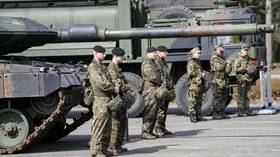German military stock at its limit after supplying Ukraine – Der Spiegel

Germany cannot deliver more weapons to Ukraine without depleting its own stocks, its defense ministry has said. Despite the military reaching the “acceptable limit” of what it can send, Chancellor Olaf Scholz is under intense pressure to keep the arms flowing to Kiev.
“We went to the acceptable limit when selling Bundeswehr stocks,” a spokesman for Defense Minister Christine Lambrecht told Der Spiegel on Monday, a day after the German news outlet published a guest article from lawmakers Kristian Klinck, Sara Nanni, and Alexander Mueller calling for Germany to up its weapons deliveries to Ukraine.
“The capability profile of the Bundeswehr (German military) can and should temporarily take a back seat to the sustainability of Ukraine in the current critical situation. Because Ukraine's survival is in Germany’s security policy interest,” the trio, who represent the three parties in Germany’s coalition government, wrote.
Since the beginning of Russia’s military operation in February, Chancellor Scholz has come under persistent criticism for his apparent reluctance to gift Ukraine with the weapons it has requested. While Berlin has sent artillery pieces, shoulder-fired rockets, and anti-aircraft tanks, Ukraine has asked for more air-defense systems and an artillery radar system, both of which have not yet been shipped.
Germany’s military was in a severely depleted state long before February, with a 2019 report revealing that fewer than 20% of the country’s 68 Tiger combat helicopters and fewer than 30% of its 136 Eurofighter jets were operational. The report also found that ammunition stocks were low and soldiers were missing essential gear, including boots, clothing, and bedding.
Despite Scholz announcing an ambitious program of rearmament in March, and despite the fact that the Bundeswehr’s budget has increased from €37 billion ($36 billion) in 2017 to €50 billion ($49 billion) this year, the military has not yet remedied these deficiencies.
As far back as March, Lambrecht was describing the Bundeswehr’s stocks as “exhausted,” and Scholz has also had to balance his stated desire to support Ukraine’s forces with his insistence that Germany shouldn’t send equipment powerful enough to escalate the conflict.
The situation is further compounded by Germany’s promises to replenish the stocks of its allies, who are sending their own stocks of heavy weapons to Ukraine in exchange for replacement equipment from Germany.
Despite these limitations, Scholz recently insisted that Berlin supplies “a lot of weapons” to Kiev, and will continue to give Ukraine “what it needs for its defense.” Scholz made these comments after retired Bundeswehr general Klaus Wittmann accused him of a lack of “leadership” and of appearing “intimidated” by Russian President Vladimir Putin.














